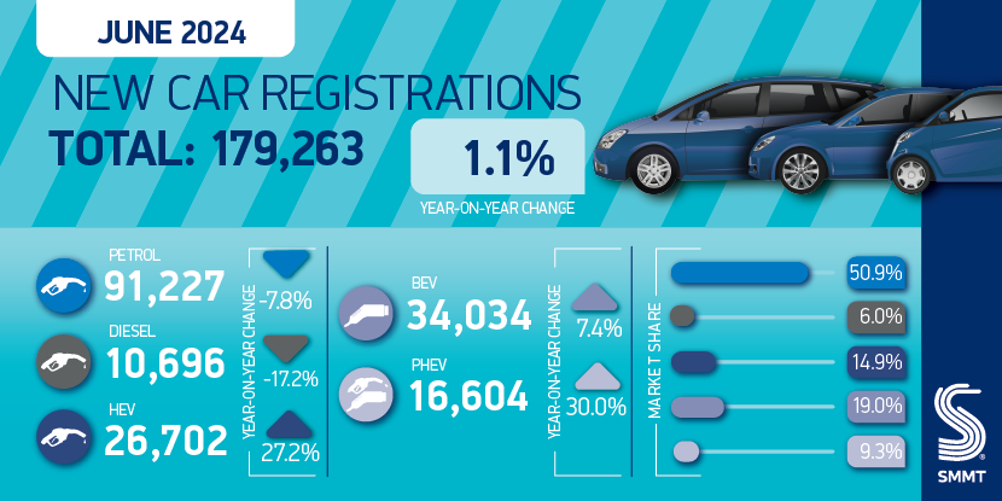New car registrations rose in June by a modest 1.1 per cent to reach 179,263 units, the SMMT reported. As a result, so far in 2024, 1,006,763 new cars have been registered, up six per cent on the previous year but still down -20.7 per cent on 2019.
The SMMT found that June’s market growth was driven primarily by the fleet sector, where uptake rose by 14.2 per cent, while private retail demand fell for the ninth consecutive month, down -15.3 per cent. Retail buyers accounted for fewer than four in 10 new cars registered (37.7 per cent).
Electrified vehicles (EV) continued to grow in June, with plug-in hybrid (PHEV) volumes up 30 per cent to reach a 9.3 per cent market share, while hybrid electric vehicles (HEV) rose 27.2 per cent to achieve 14.9 per cent of the market.
Both powertrains also outpaced battery electric vehicle growth (BEV), which rose 7.4 per cent but took its highest monthly share this year, accounting for 19 per cent of all new vehicle registrations.
The SMMT reported that the UK’s zero emission transition – and the ability of manufacturers to meet the requirements of the Vehicle Emissions Trading Scheme – currently relies on the fleet sector as private consumer uptake continues to soften.
The report found that private BEV uptake has fallen, with fewer than one in five new BEVs going to private buyers. Overall, BEVs now comprise 16.6 per cent of the new car market so far this year, slightly above the 16.1 per cent achieved in the same period last year, with uptake behind the levels mandated by government.

In the wake of Labour’s General Election victory, the automotive industry is calling on the next government to provide greater support to the consumer on the journey to zero emission mobility.
According to the SMMT, re-instating fiscal incentives for the private consumer by way of a halving of VAT on BEVs for three years would re-energise the market, putting an additional 300,000 private BEVs on the road over the next three years, on top of current outlooks.
The report said this would help ensure that in 2035 half of all cars in use would be zero emission, cutting road transport CO2 emissions by 175m tonnes.
The SMMT also said that Vehicle Excise Duty plans should be revised so that zero emission vehicles (ZEVs) are classed as essential rather than ‘luxury’ vehicles, by amending the ‘expensive car’ supplement due to be applied from next April.
In addition, the organisation said that public charge point use could be made fairer by reducing VAT from 20 to five per cent, in line with home charging – a move that would support ZEV uptake and send the right message to consumers.
In a statement, Mike Hawes, SMMT chief executive, said: “The year’s midpoint sees the new car market in its best state since 2021 – but this belies the bigger challenge ahead. The private consumer market continues to shrink against a difficult economic backdrop, but with the right policies in place, the next government can re-energise the market and deliver a faster, fairer zero emission transition.
“All parties are agreed on the need to cut carbon, and replacing older fossil fuel-based technologies with new electrified powertrains is the essential step to achieving that goal.”











Invinity to build 20MWh flow battery in UK
Redux flow cells have had nowhere near the R+D effort compared to Lithium ion. They certainly have the potential (pun not intended) for longer...